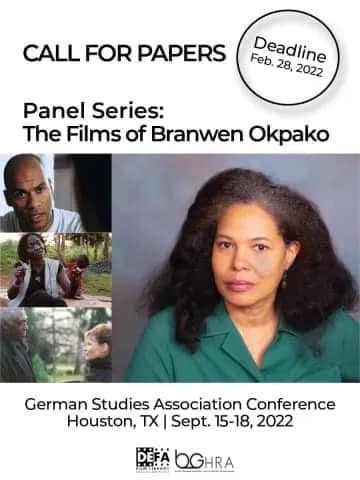The Films of Branwen Okpako
CfP for a GSA Panel Series
We invite contributions for a series of panels on Branwen Okpako’s films, for the 2022 GSA conference, Sept 15-18. Co-sponsored by the Black German Heritage & Research Association (BGHRA) and the DEFA Film Library, these panels seek to explore the range of stories and rich imagery in the films of this groundbreaking director.
Relevant topics might include:
- Afro-Germanness and Afro-German creativity and artistic production;
- Form, filmmaking, and aesthetics;
- Postcolonial and feminist consciousness at the intersections of multiple cultural and familial traditions, norms, values;
- Regimes of the body; femininity and gender;
- Engagement with disciplinary regimes, e.g. the police, political regimes, or language;
- German reunification and its repercussion on discourses of racialization, positionality and representation in Europe and Germany;
- Family his- and herstories;
- Affiliation and belonging;
- Political activism and self-empowerment; and
- The reception of Branwen Okpako’s films.
Please submit a 300-word abstract by February 28, 2022, to Rosemarie H. Peña (President, BGHRA: rosepena@scarletmail.rutgers.edu) and Mariana Ivanova (Academic Director, DEFA Film Library: mzivanova@umass.edu).

The selection committee consists of Kevina King (VP, BGHRA; Project Assistant, DEFA Film Library: kevina@german.umass.edu), Emily Frazier-Rath (Exec Director, BGHRA Institute: emfrazierrath@bghra.org), and Sara Lennox (Principal Consultant, BGHRA; Prof. Emerita, UMass Amherst: sarajlennox@gmail.com)
About Branwen Okpako
Born in Lagos, Nigeria, Branwen Okpako studied directing in Berlin, and her graduation film, Dreckfresser (2000), the portrait of an Afro-German police officer in the GDR, won numerous international prizes. Her fiction feature Tal der Ahnungslosen (2003)—the story of an Afro-German policewoman, who was an abandoned girl, discovering her biological parents and past—premiered at the Toronto International Film Festival and competed at the Pan-African Film and Television Festival of Ouagadougou. Die Geschichte der Auma Obama (2011), a feature-length documentary about Barack Obama’s sister, her creative path, and postcolonial and feminist consciousness, won multiple awards. The documentary-drama Der Fluch der Medea (2014), with the late (East) German author Christa Wolf, premiered at the Berlinale. Branwen Okpako teaches at UC Davis and is currently completing Chibok Girls, a feature film based on the 2016 novel by Nigerian author Helon Habila about the mass abduction in northern Nigeria. She is one of the keynote speakers at the 2022 conference of the Black German Heritage & Research Association (BGHRA) (February 17-20) and, in 2021, was a featured guest in the virtual film festival Black Lives in Germany: Resilience – Art – Hope, which was curated by Kevina King and organized by the DEFA Film Library at UMass Amherst.
As Angelica Fenner wrote in her 2012 interview with the director, Okpako’s films “open up axes of communication between African and European cultures under evolving conditions of globalization.” In her important work, Okpako confronts misconceptions about Afro-Germanness, Blackness at large, and womanhood. Her oeuvre awakens silenced memories of a lonely childhood in East Germany or the West and digs up repressed thoughts and pasts or complicity with totalitarian and disciplinary regimes. At the same time, the filmmaker’s work has a clear political agenda of self-empowerment, from giving voice to family his/herstories fractured by adoption or the absence of parents, to women like Auma Obama and Christa Wolf striving and succeeding in empowering themselves and others.

